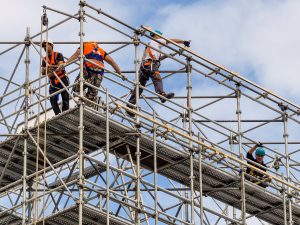What You Should Know About Premise Liability
 Michael Babboni
Premises Liability
Premise liability laws, often known as the “slip and fall” laws, tend to have a bad reputation due to how often they are cited in frivolous and fraudulent lawsuits. Though some may attempt to take advantage of these laws, these only make up a very small percentage of the liability lawsuits and they are rarely successful in doing so.
Michael Babboni
Premises Liability
Premise liability laws, often known as the “slip and fall” laws, tend to have a bad reputation due to how often they are cited in frivolous and fraudulent lawsuits. Though some may attempt to take advantage of these laws, these only make up a very small percentage of the liability lawsuits and they are rarely successful in doing so.Premise liability laws exist in order to promote and encourage safer environments for everyone. Though accidents can happen to even to the most careful person, there is still a lot that can be done to improve the safety of a place or person. Without such laws in place, company's, property owner's, and other liable persons are less likely to consider or work towards the safety of others. Though slip and fall claims do make up a portion of premise liability, it also includes keeping others safe from environmental or chemical hazards as well.
So where do most premise liability lawsuits take place?
The Workplace
Your employer is responsible for keeping the work environment safe for everyone. For some careers, this is a lot easier said than done. For example, some jobs require workers to use dangerous machinery or chemicals in order to do their work. This can make it tricky when employees end up getting harmed in their work. However, if the worker was not trained in how to use these tools safely or they are harmed due to someone else's actions or neglect, then the company is still liable for their injuries.
However, since these injuries happened on the job you will need to file for workers' compensation rather than make a premise liability claim.
Grocery Stores
With the large amounts of food and drinks stored, it is easy for things to break and messes to occur. Though it is often not the store employees who cause these messes, it is their responsibility to make sure everything is dealt with as quickly and safely as possible. If the store employees neglect to do so or are responsible for the fall happening, the store is liable for your injuries.
It is also important that workers safely use and take care of any machinery necessary to doing their job. Leaving something dangerous like that for someone to trip on also makes the store liable for their injuries.
Public Places
Public places like schools and parks need to be safe for the public. For example, if a school is old enough to still have lead paint on their walls and they never took care of it, they are liable for letting others get sick from exposure. The school is responsible for the safety of those teachers, students, and other faculty members. In not taking care of the toxic paint, they have neglected their responsibility and allowed others to be harmed in doing so. It is especially important in areas that are frequently visited by children.
What do you need to prove in a slip and fall or other liability case?
In these types of cases, you need to be able to prove that your injuries are a direct result of someone else's actions or neglect. This means you need to show that the liable person knew about the dangers and still continued with no result for someone else's safety. For example, if you slipped and fell due to a spill on the floor, you need to prove that an employee was aware of the spill and neglected to take care of the mess. The store may also be liable if you can prove that they have no safety measures or training put in place when spills and other dangers occur.
If you have been in a slip and fall accident or another type of liability accident, you may qualify for financial compensation for your injury. Financial compensation can go a long way towards helping you pay for any medical treatment or procedure you may need after an accident. It can also go towards any wages lost due to being temporarily unable to work during your recovery. As mentioned before, reporting a slip and fall also ensures that the same mistake will not happen to someone else either.
